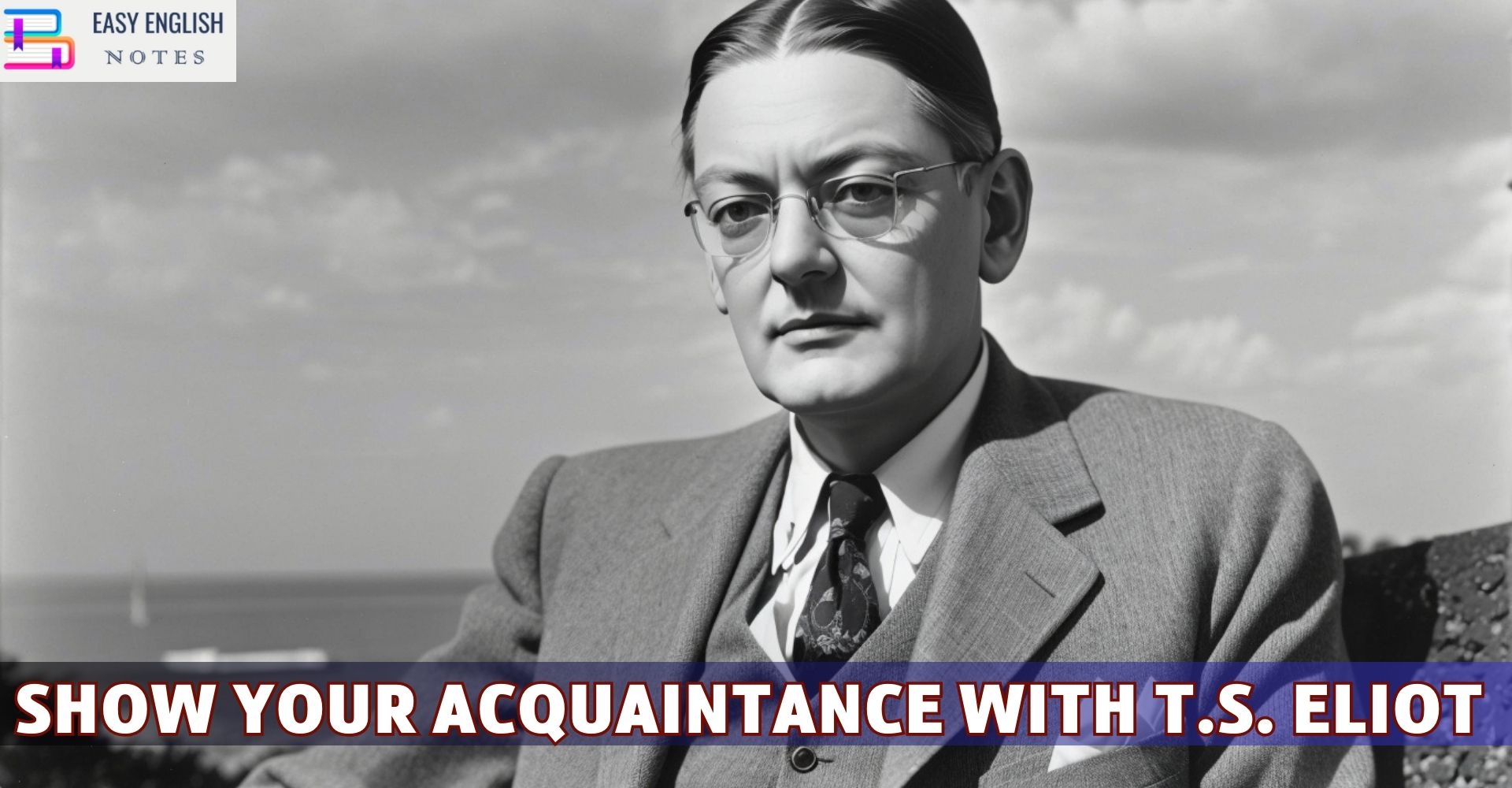Thomas Stearns Eliot was born at St. Louis and was educated at Harvard University. In 1914, he settled in London, where he has lived ever since becoming a naturalised Englishman in 1927. For a time he was Assistant Editor of The Egoist, and helped to found The Criterion’ of which he was the Editor. He was Director of the Publishers, Faber and Faber Limited. He greatly influenced the younger generation of writers in both England and America.
As a poet, he has the most outstanding influence on modern poetry. It would be wrong to imply that he wrote one kind of poetry before. roughly The Wasteland and another kind of poetry after it. The only difference in spirit to be found between his early poetry and his later poetry is that doubt predominates in the one and faith in the other. In 1948 Eliot was awarded the Nobel Prize for literature.
Eliot is most known to the readers of English literature. He is known as a poet and critic. But his poetic plays are also widely read. Some of them are also staged and appreciated. Poets may be greater than Eliot, critics may be greater than Eliot, but there is hardly any who has influenced so many of his generation, and who has been influenced so much by the tradition, and who has gained so much popularity in his life-time. There is hardly any one who has not heard of ‘The Waste Land’ and ‘The Four Quarters that brought to him the most prestigeous Nobel prize. Poets may be more original than Eliot, but few poets are so skilled as Eliot. He has stolen a large number of expressions from great authors without being charged of plagiarism.
Also Read :
- Compare Hamlet with Macbeth, Othello and other Tragedies
- “The Pardoner’s Tale” is the finest tale of Chaucer
- Prologue to Canterbury Tales – (Short Ques & Ans)
- Confessional Poetry – Definition & meaning
- Line By Line Explanation Of The Poem The Eve of St. Agnes
Eliot as a Poet: T.S. Eliot is regarded as the greatest English poet of the modern times. He makes the reader aware not only of the problems of modern life but also of mankind as a whole. Referring to his importance in modern English poetry Pinto observes in Crisis in English Poetry: “The important fact that every poet and indeed every serious writer had to face in England in the first half of the twentieth century was that the society in which he was living was in a high degree hostile to the spiritual life.” The First World War in its later phases opened the eyes of poets like Sasson, Owen and Rosenberg, who suddenly saw the modern world in all its naked horror unmasked by the impact of war, and were shocked into the creation of vital poetry. Conditions of life in the trenches in 1917-18. however, might be considered exceptional. If poetry was to regain its honesty, it would have to recognise the fact that the values of the old cultivated middle class were dead beyond recall and that it was necessary to find expression for a new sort of sensibility arising out of conditions that were wholly different from those of the agricultural class dominated society from which the old traditions of English poetry had sprung. The result would necessarily be a poetry that would appear to many readers brought up in these traditions to be both “unpleasant’ and difficult. It would appear to be unpleasant because contemporary society was in a state of progressive degradation and if poetry was to be a true “criticism of life’ and a revelation of its essential nature, it had to express the horror of such a world, a horror from which the poets had, for the most part. averted their eyes, though it had been revealed in different mediums by a series of novels from George Gissing to Joseph Conrad.
T.S. Eliot wrote in his essay on The Metaphysical Poets, “that poets in our civilization, as it exists at present, must be difficult. Our civilization comprehends great variety and complexity, and this variety and complexity. playing upon a refined sensibility, must produce various and complex results. The poet must become more and more comprehensive, more allusive, more indirect in order to force, to dislocate, if necessary, language to his meaning. The poets would, in fact, have to attempt the supremely difficult task of creating new poetic idioms and rhythms out of modern colloquial speech, suggestions from older English poetry or the poetry of other nations. They would only be able to communicate with an elite consisting of readers who shared in some degree their own power of perceiving the aesthetic significance of the changes that were taking place in the contemporary world. This would have the advantage of enabling them to concentrate on the task of expression, but would also have the drawback of making them, in some degree at any rate, exclusive bookish and inhuman.
PLEASE HELP ME TO REACH 1000 SUBSCRIBER ON MY COOKING YT CHANNEL (CLICK HERE)











